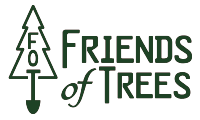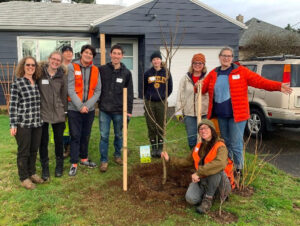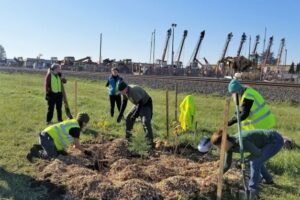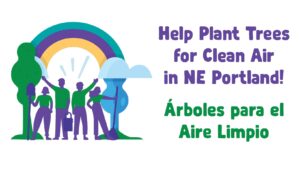Tag: community tree planting
Your voice is needed for more trees in Portland
We need your voice to help make sure that tree planting efforts in Portland are equitable, inclusive and community-driven.
You may have heard of the Portland Clean Energy Fund (PCEF), approved by voters in November 2018. PCEF is intended to provide a consistent, long-term funding source to ensure that our community’s climate action efforts support social, economic and environmental benefits for all Portlanders, particularly communities of color and people with low incomes.
PCEF has dedicated $40 million for tree planting and tree care. The Equitable Tree Canopy Program will work in Portland’s most heat-vulnerable neighborhoods to equitably plant and establish 15,000 – 25,000 trees on public and private property.
Friends of Trees testified at City Council in support of this exciting initiative and continues to be engaged in the process, partaking in three roundtable conversations that helped inform the current draft of the Equitable Tree Canopy Program.
Right now, PCEF is looking for feedback on the working draft, which you can review here. Feedback is due by March 2, 2023 and can be made through emailing [email protected]. Friends of Trees needs your help to promote these points:
- Authentic community involvement in implementing the tree planting program. We recognize that the government, as the funding instrument, plays a role, but we know through 34 years of community tree planting that inclusive community engagement is key to ensuring buy-in and long-term success.
- Flexibility in funding language. This is a new endeavor with a lot of funds available and a very ambitious goal. It’s critical that the City and PCEF allow for language that is responsive to community needs as this program is implemented and evolves.
- Opt-in approaches for street AND yard tree planting. This means tree recipients proactively say Yes to a tree as a result of community based outreach and education. Friends of Trees knows that the opt-in method helps ensure that the trees that are planted survive and thrive because of the tree recipients’ buy-in.
- Include funding for planting yard trees. We all know the benefits that street trees provide, like shaded sidewalks and cooler neighborhoods. We also know that many folks don’t have planting strips where they can plant a street tree, but do have space for yard trees, and others really want fruit trees (which aren’t the best street trees). The more trees the better!
This is not only a historic funding opportunity, it’s a chance for the City to take giant strides toward authentic community engagement through a structure that entrusts community organizations to co-manage the tree planting funds. And we’re set up for success with a model like this: Friends of Trees and other community stakeholders such as Verde and the Jade Greening Project have successful track records with authentic community engagement, community tree planting, and collaborating to achieve common goals inclusively and equitably.
Public comment periods are your chance to have your voice heard. Join us in supporting funding for community tree planting for years to come!
Eugene’s Northwest Expressway Plantings
Two Decades of Planting along the Northwest Expressway
Every season, the Eugene Branch kicks off its planting season along the Northwest Expressway, a five-mile stretch of road parallel to the railroad. It’s not the most glamorous of planting sites, but there is plenty of available space for large trees to grow and provide their benefits to the community.
Friends of Trees volunteers will gather in Eugene on November 5th for Phase 9 of this planting project. The land is owned by Lane County and abuts the Union Pacific railyard. Friends of Trees picked this annual planting project up in 2013, but it actually started back around 2000, with what we now call Phase Zero, planted by the Eugene Tree Foundation (which became Friends of Trees – Eugene). That first planting has grown into sizable shade trees, and has served as the site of a condoned homeless camp for veterans in Eugene.
“Those trees are now providing shade to people,” says Eugene Director Erik Burke. “It goes to show that trees can still have benefits when they’re planted in places besides private property.”
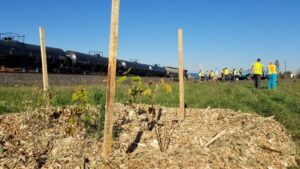
For these Northwest Expressway plantings, the Eugene team is creating pods of plants. After removing a eight-foot diameter of grass, they’ll plant one-to-four trees and four-to-six shrubs. In addition, this year they’ve added camas bulbs to the recipe, and will also be adding native milkweed and Douglas’ aster.
Installing understory layers in addition to trees is an approach that the Eugene team hopes to expand on for all their plantings. This year, they’re offering camas bulbs as an add-on for neighborhood tree recipients.
“We really want to be creating habitat for native pollinators,” Erik says. “So we’ve got 900 camas bulbs to plant this season.”
This year at Northwest Expressway, they’ll plant 20 trees, 50 shrubs and 50 herbaceous plants along Northwest Expressway.
“We started planting at the southern end of the expressway, then moved to the north, and now we’re filling in the middle,” says Eugene-Springfield Program Manager Taylor Glass. “We’re required to space these pods out a bit, but that means we have plenty of space to plant trees that will grow to be quite big.”
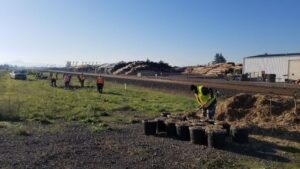
The next time you’re driving on Northwest Expressway, keep your eye out for incense cedars, Pacific madrones, valley ponderosas, giant sequoias, and California laurels. What used to be an empty stretch of grass is on its way toward being a happy home for trees.
Clean Air Canopy
Trees for Clean Air in NE Portland
If you live in Sumner, Cully, Parkrose, Argay, or Wilkes, register here to get a free tree!
Of all the benefits that trees provide, clean air is one that entire communities benefit from. When the Owens-Brockway glass facility was found to be excessively polluting in the vicinity of several Northeast Portland communities and the Columbia Slough Watershed, the Oregon Department of Environmental Quality fined the facility and granted funds to Friends of Trees and our partners to lead community tree plantings in the area.
Friends of Trees, in partnership with community members and organizations, will coordinate the planting of 5,000 native plants and trees over the course of the Clean Air Canopy project.
Of these, about 800 trees will be located along neighborhood streets and private properties in the Sumner, Cully, Parkrose, Argay, and Wilkes neighborhoods. 4,200 more native plants and trees will be planted in natural areas located across these neighborhoods and along the Columbia Slough watershed.
This project would not be possible without our partners: Verde, the Cully Air Action Team (CAAT), and the Cully Association of Neighbors. Verde and CAAT’s advocacy work held this polluter accountable and led to this project’s creation. These partners have been instrumental to our outreach efforts.
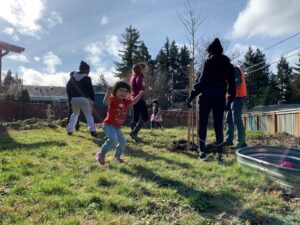
“This project really represents the breadth of what we do at Friends of Trees,” says Green Space Program Manager Michelle Yasutake. “Working in both neighborhoods and natural areas, connecting with community members, and providing a tangible benefit in the form of cleaner air.”
These new trees and native plants will improve air quality and the quality of life for residents of these NE Portland neighborhoods. Leaves from the trees planted in this project will not only intercept and store particulate matter from the air, they will provide shade and cooling benefits, lessen urban heat island effects, and improve habitat and stormwater management.
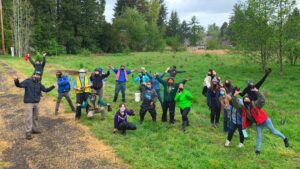
Friends of Trees is already working with community members to identify planting locations. Planting and caring for the trees together gives us a chance to talk with the community about the positive impacts of clean air, clean water, and healthy urban tree canopy in neighborhoods and nearby industrialized areas.
“We’re really excited for this opportunity to form connections with residents, and to work alongside them to understand their needs and bring trees to their community in a way that works best for them,” says Aliesje King, the Neighborhood Trees Program Manager at Friends of Trees.
If you live in Sumner, Cully, Parkrose, Argay, or Wilkes, reach out to us to get a free tree! Register here, or email us at [email protected] with any questions.
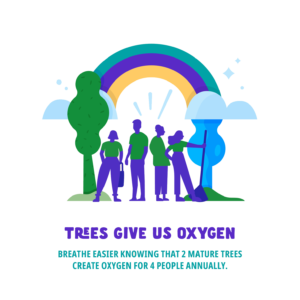
Wrapping Up A Successful Season in Eugene
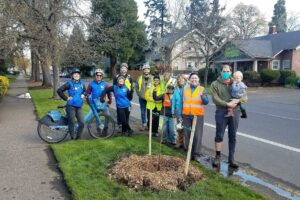
What a year in Eugene-Springfield! Every event was full of eager smiles, familiar faces, and enthusiastic treecipients. “There’s nothing better than a fantastic day of planting with community members,” says Volunteer & Program Specialist Taylor Glass. “We had so many great events this year. It’s a great way to connect.”
Even while adapting to the pandemic, the Eugene Branch has done so much to grow their program and expand their impact, and we wanted to report to you some of this season’s results.
- Friends of Trees volunteers planted 524 trees at 12 events in Eugene and Springfield, and distributed 350 more at a tree give-away event.
- 475 total volunteers donated over 1,500 hours of their time to these efforts. We have seen firsthand how planting and caring for trees increases community members’ engagement with the environment and participation in civic life.
- We planted 86 different species of trees, many of which are climate resilient, to grow the diversity of our urban canopy.
The season saw so many highlights, like expanding the use of bicycles, planting trees at schools, and honoring the legacy of community leaders. We grew our relationship with the City of Springfield, an important geography for our equity work. This season’s work was all about being intentional.
“The pandemic, racial justice issues, and extreme heat of the last few years, have focused our urban tree planting work more on equity, sustainability, and resilience.” says Eugene Director Erik Burke.
This work couldn’t be done without our dedicated volunteers, partners, and sponsors. This summer, we will continue to work with volunteers on tree care and inspection, and we’ll be preparing for another incredible season come October!
Together we can grow the canopy: Friends of Trees Op-Ed
By Yashar Vasef
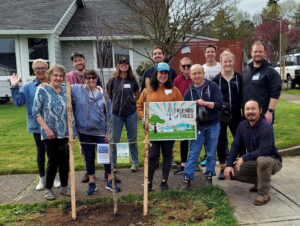
On Sunday, April 3, The Oregonian published an Op-Ed that I wrote: “Amid shrinking canopy, community tree planting needed more than ever.” In it, I address Portland’s reported tree canopy loss and the end of our contract with the City of Portland to plant street and yard trees in the city. We appreciate the opportunity to bring attention to the importance of community tree planting and we are so grateful for all the support we’ve already received.
We wanted to share its contents with you, and answer some of the questions you may have after reading it.
Opinion: Amid shrinking canopy, community tree planting needed more than ever
The recent report about the loss of tree canopy in Portland is yet another piece of grim news related to how the climate crisis is threatening the health of our environment and our community (“Portland tree canopy has stagnated or shrunk, harming city’s climate change aspirations,” March 22). The report indicates that Portland’s urban tree canopy has shrunk or plateaued for the first time in 50 years – a warning that the city will not be able to meet its goal of having tree canopy encompass 33% of the city’s area by 2035.
Unfortunately, the release of the report coincides with the end of Friends of Trees’ 14-year contract with the city to plant street and yard trees through community planting events. This nationally-replicated partnership between Friends of Trees and the city has added nearly 40,000 street and yard trees throughout Portland since 2008, while engaging thousands of community members as volunteers to plant and care for these trees. About 70% of those trees were planted in underserved, low-canopy neighborhoods to address inequities in the distribution of Portland’s trees.
We truthfully do not know why this successful partnership is ending. There has been an abundance of rumors and speculation, but all we know is that our contract ends this June and we do not know of any city plan to invest in programs that center authentic community engagement in planting street and yard trees in Portland. Especially as we see accelerating and intensifying climate impacts right here at home, fighting climate change needs all hands on deck: government, nonprofits and communities collaborating with a necessary sense of urgency.
It’s not just about ending a contract with Friends of Trees—we understand that contracts end and terms change. But given that we are experiencing a true climate crisis, we don’t believe this is the time to cut a successful tree planting program that also builds community through bringing volunteers together to help grow our urban canopy. Tree planting is one of the best tools at our disposal, and we encourage our city leaders to increase and broaden investments in community tree planting – with us or with others – and to pursue other proven strategies that fight climate change, promote climate action and foster climate justice.
Friends of Trees is fortunate to have growing support throughout the region and from other municipalities. We want to keep our momentum here in Portland, too, where we can harness our established partnerships, volunteer resources and community buy-in to contribute to the efforts to plant more trees in Portland. We believe that the city should continue to fund community tree planting; of course, we would love to be included in that funding, and we think other organizations should be included, too. This is the time to grow public investment in trees, not cut back.
We need trees more than ever, for their ability to improve air quality, store stormwater, provide shade, improve the mental and physical health of our community members and so much more. That’s why we engage trained volunteers to check on and help care for each tree after it gets planted. Post-planting care and assessment, combined with ongoing communication with tree recipients, contributes to a 95%-plus survival rate.
Community planting nurtures more than trees. Our events engage volunteers of all ages, races, religions, sexual orientation, gender identity, economic status and political views to plant and care for trees together. We partner with other organizations that center climate justice and engage people from historically underserved communities to directly play a part in improving the health and livability of their neighborhoods. It includes environmental education and internships that expand opportunities to enter the green workforce. Authentically engaging communities is crucial toward achieving climate justice.
There is a ripple effect from participating in tree planting that goes beyond the trees and the many benefits they provide. We have seen firsthand how planting and caring for trees increases community members’ engagement with the environment and participation in civic life, especially when it comes to climate action. An investment in community tree planting is an investment in stewarding future climate action.
We recognize that the end of this partnership raises questions about the future of our work, particularly in Portland. While the partnership with the City has been a significant part of our organization’s history, there’s so much else that Friends of Trees provides to the community, and we will continue to keep engaging volunteers to plant and care for as many trees and native plants as we can in Western Oregon and Southwest Washington.
Q: What is Friends of Trees doing in response to this development?
We are doing everything we can to make sure that there is still community tree planting in Portland. We are talking to partner organizations, community members, and government officials about how we can make tree planting easier, more accessible, and more equitable.
We will also continue growing our work with other municipalities throughout the region, as we find great value in these partnerships and what they can accomplish. And no matter where we plant, we will plant the Friends of Trees Way.
Q: What’s wrong with the City planting trees themselves?
Absolutely nothing! We want the City to plant trees. We do not believe that this issue is us versus them. There is an important role for government to play in planting and caring for trees.
We believe that it’s also important to include community organizations in those efforts. We want to help, and we want our partner organizations to be able to help. The more trees that get planted, the better. Be it with the City, Friends of Trees, or other community organizations, all avenues to tree planting should be open.
In addition to getting trees in the ground, Friends of Trees adds unique value to the process through community engagement. We have been involving community members in tree planting for over 30 years. Our staff has knowledge that goes beyond tree planting and tree care to volunteer engagement and education. Authentic engagement with the community always leads to more success for the tree.
More FAQ with additional information is here, we will update as needed. Thanks so much for supporting trees + community!
